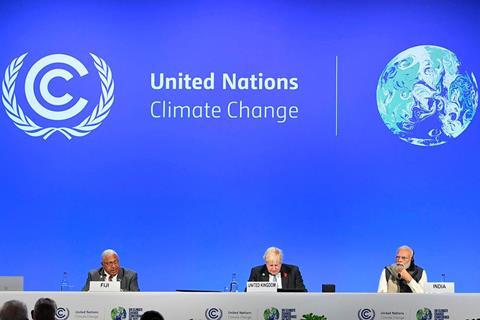The science is crystal clear – our climate is changing and will cause flood and famine on an unimaginable scale. It is an irony of evolution that our advanced brains and social structures have devised a means to extinguish our species by changing the very climate that sustains it and most other life forms on the planet. We also possess the knowledge and means to avert the crisis. But our political systems are so unevolved, that they do not reflect the will of the people. Can we use the law to protect the planet?

International law
The UN Framework Convention on Climate Change 1992 was a pioneering international document on climate change. Its long-term objective of the Convention and its related legal instruments is 'to achieve […] the stabilization of greenhouse gas concentrations in the atmosphere at a level that would prevent dangerous anthropogenic interference with the climate system' (article 2). Unfortunately, it did not set targets, but set up an international system to negotiate targets. This led directly to the Kyoto Protocol in 1997, which led to the Paris Accord in 2015 which set generalised targets on greenhouse. None of these were binding and therefore could not result in international action against any country, even if a forum for such cases existed.
There are numerous international obligations which governments are obliged to adhere to. The most famous of these is the Universal Declaration of Human Rights. Article 3 guarantees 'the right to life, liberty and security of person'. Already many thousands of people are dying of respiratory illnesses, floods, famine and heat caused by climate change. The figures will rise exponentially. Island nations are likely to be under water in the next 50 years. Increasing heat in central Africa may cause migration of millions of people desperately seeking a habitable region which can sustain crops. They will rightly hold industrial nations to account for their plight. There is no current framework to give them redress.
National law
Environmental lawyers saw a great victory in the Court of Appeal last year when the government’s approval of a third runway at Heathrow was declared unlawful because it had not taken into account the Paris Climate Accord, which requires global temperature rise as close to 1.5C as possible. Sadly this victory was short-lived. The Supreme Court overturned the Court of Appeal ruling, allowing the airport to seek a development consent order. Such an order will nonetheless have to bear in mind the government’s international agreements on climate change.

Courts in other countries have not been so reluctant to strike down legislation. In Germany this year, the Constitutional Court struck down an act of parliament and effectively forced a federal government to act in accordance with the Paris Accord.
A Dutch Court required Shell Oil to reduce gas emissions produced by its customers by 45% by 2030. Both the German and Dutch Courts calculated the burden that the government (in the German case) or the company (in the Dutch case) had to bear as its proportion of the Paris Accord.
Bolivia created a Law of Rights of Mother Earth in 2010, giving the planet a right to life, diverse life, clean water and clean air. They come with duties imposed on government, corporations and citizens. These are actionable rights.
The USA (like the UK) gives its citizens very limited rights to initiate legal action against corporations or the state in protection of the environment, unless the individual’s private right is breached. Private actions in protection of the environment are therefore unlikely to succeed there. India, which has just announced at Cop26 that it will reach a zero emission target by 2070, has far more direct actionable rights for its citizens, allowing them 'standing' in court in protecting environmental rights when government or corporations are breaching them. New Zealand, in similar spirit, has granted legal status to the Whanganui River. Norway promulgated a 'zero deforestation' law and Kenya has banned the production of new plastic bags for consumers. More and more countries are 'stepping up' on environmental protection, usually because their citizens expect such change.
National courts
Environmental bodies in various countries have reported a growing number of prosecutions against corporations. The UK has led the way amongst European countries in prosecuting large corporations that export waste to developing nations, or who pollute national waters and the air.
On the other hand, there is also a trend amongst many countries to control (with heavy-handed legislation and policing) protests, many of which are climate related.
Cop26
The usual pattern for international meetings on climate change is as follows: (i) a dampening of expectation at the start; (ii) a series of 'blockbuster' statements which are full of hyperbole; (iii) little action over the next few years.
We have already been treated to (i) and (ii) above. There is much more of it on the way. As lawyers we need to hold each leader’s statement the way we would a witness’ statement:
(a) Ask what the real substance of the press release is when stripped of the hype; does the promised benefit amount to a significant response to the threat of climate change?
(b) Is there a way of checking compliance? If not, discount the entire statement.
(c) Is there a way of enforcing what is being pledged, either nationally or internationally? If not, the pledge is simply hope dressed up;
The real fear, based on historical evidence, is that the rhetoric will not match the reality of what is needed. We have been placed at one minute to midnight on the Doomsday Clock and it may continue ticking past the point of no return. If we do not rise to the challenge of this existential threat, the earth may have plans which do not include the human race.
Sailesh Mehta is a regulatory and criminal lawyer specialising in environmental law































1 Reader's comment